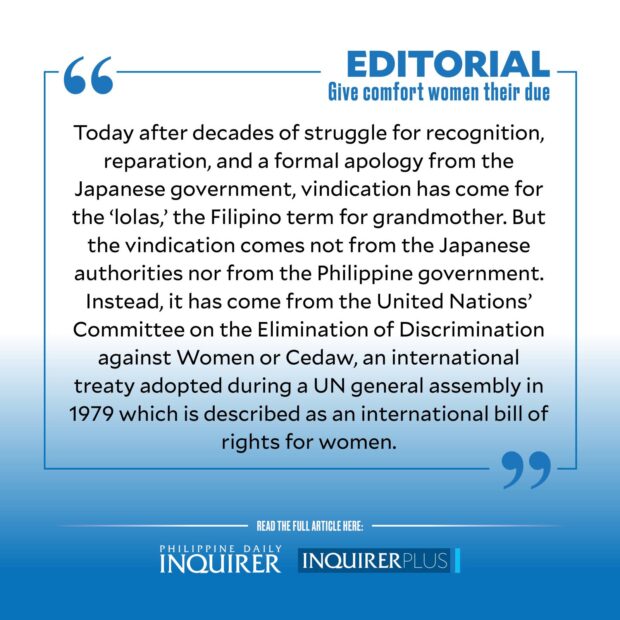Give comfort women their due
Almost 80 years ago, Filipino women in the Central Luzon region were rounded up, brought to an old house called “Bahay na Pula” or Red House in San Ildefonso town, Pampanga province, where they were detained for weeks. Until they were released, says a report by the United Nations’ Committee on the Elimination of Discrimination against Women (Cedaw), the women, some in their teens, were “repeatedly subjected to rape, other forms of sexual violence, torture, and inhumane detention conditions.”
Their experiences as “comfort women,” the Japanese euphemism for prostitutes which has come to be applied to victims of institutionalized sexual violence against women in countries under Japanese control during World War II, would come to haunt the women for the rest of their lives. They were forced to “endure long-term physical, psychological, social and economic consequences, including physical injuries, post-traumatic stress, permanent damage to their reproductive capacity, and harm to their social relationships in their community, marriage, and work.” Well, today after decades of struggle for recognition, reparation, and a formal apology from the Japanese government, vindication has come for the “lolas,” the Filipino term for grandmother. But the vindication comes not from the Japanese authorities nor from the Philippine government. Instead, it has come from the Cedaw, an international treaty adopted during a UN general assembly in 1979 which is described as an international bill of rights for women.A few days ago, Cedaw issued a decision finding the Philippines “violated the rights of victims of sexual slavery perpetrated by the Imperial Japanese Army during the World War II by failing to provide reparation, social support and recognition commensurate with the harm suffered.”It called on the government to set up a compensation fund for the victims, create a memorial to preserve the site of the Bahay na Pula, and include the wartime sex slavery in school curriculum as an important part of history.
Previously, the Philippine government had maintained that it is not in a position to claim compensation from Japan after ratifying the Treaty of Peace with Japan in 1956. Despite repeated suits and appeals to the courts, the comfort women’s case was dismissed by the Supreme Court in 2014. They then brought their cause to the attention of Cedaw in 2019.
Cedaw noted that the case is one of “continuous discrimination.” It further pointed out that war veterans, who are mostly men, are entitled to special and esteemed treatment from the government, such as educational benefits, health care benefits, old age, disability, and death pensions—in contrast to the shabby treatment of comfort women. The Committee found that the Philippine government had failed to adopt “appropriate legislative and other measures to prohibit all discrimination against women and protect women’s rights on an equal basis with men.”
As if to add insult to injury, in 2018, personnel of the Department of Public Works and Highways and the city government of Manila “hurriedly dismantled” in the dead of night a bronze statue erected as a tribute to the comfort women. Former president Rodrigo Duterte said the next day that while the monument was “freedom of expression … it is not the policy of government to antagonize other nations” and it should therefore be placed elsewhere. The statue had been situated by the seawall in Manila Bay, and although it had been funded by private donors, its erection had been cleared with the National Historical Commission.
The removal of the statue took place shortly before an annual summit of the Asian Development Bank, though the Japanese embassy had protested the statue previously. Later, the Manila city government said they removed the statue to conduct a drainage improvement project in the area and said they returned the statue to the sculptor, Jonas Roces.
“Ang nangyari, lumuhod tayo sa mga Hapon (What happened was, we knelt before the Japanese),” said Teresita Ang See of the Kaisa sa Kaunlaran Foundation which led the fundraising effort for the statue. Historian Xiao Chua, who alerted the public about the “missing” statue, called on the public to fight for the return of the monument, saying that the honor of the country was at stake.
A year later, after finding a place for the statue at the Baclaran shrine, the statue was supposed to be installed after Roces was paid to transfer and install the image. But Roces did not show up and neither did the statue. The sculptor then claimed that the statue had been stolen by unidentified men and then he himself disappeared entirely.Who knows if, after the Cedaw finding, the comfort women statue would suddenly be found and erected in a place of honor?
To use a sporting metaphor, the ball is now in the court of the Marcos administration. Will it comply with the Cedaw recommendations or will it continue to deny the “lolas” their rightful share of honor, reparation and justice?





















